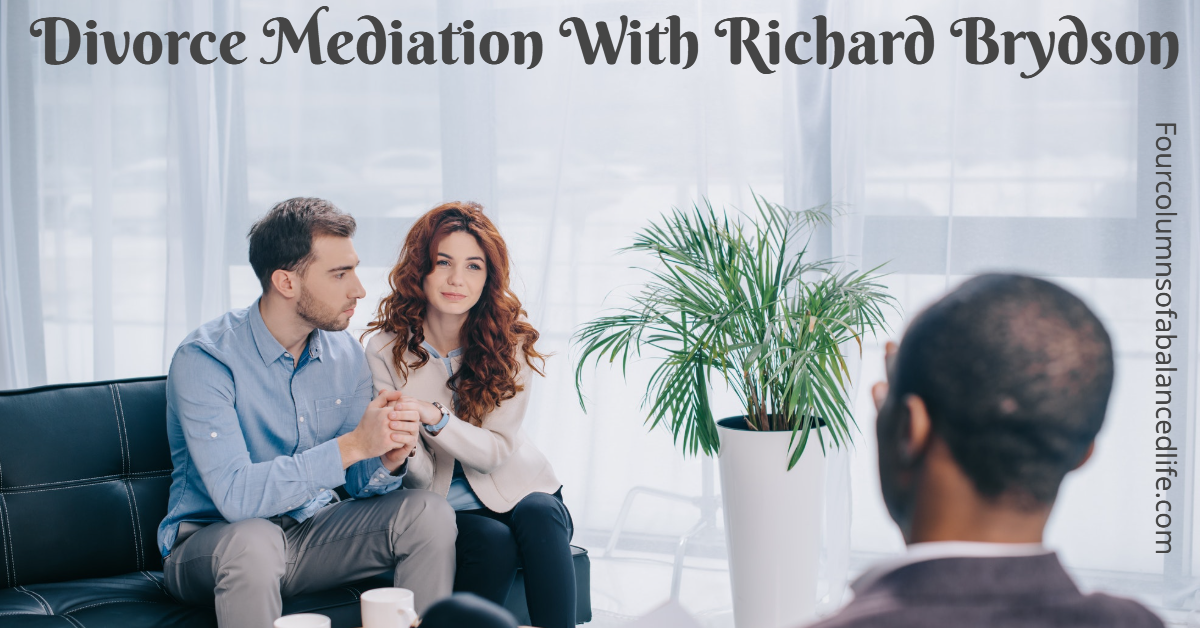Divorce Mediation

Divorce mediation involves a good-faith negotiation between two parties and an experienced mediator who assists them in reaching an agreement during a fair process. If two spouses cannot agree on issues concerning their divorce or separation, a mediator can help them resolve these matters out of court. I recommend divorce mediation as it is private, better preserves people’s autonomy, and costs a tenth of an average court process.
The mediator is a neutral third party who can be the catalyst to resolving conflict by managing conversations on how clients will share parenting time, around support payments, and property division. The mediator does not take sides, give legal advice, or make decisions for their clients.
Divorce mediation is a powerful and transformative empowering approach to conflict resolution. Empowerment is cognitive and helps the two individuals see alternatives and choices. Empowerment is awareness. Empowerment is all about keeping a distance from the negative actions, beliefs and embracing positive choices towards fulfilled living.
Empowerment is also accepting the changes in our relationships, emotions and not be scared of fear or judgment.
Richard Brydson is a Family Mediator and the Owner at Aligned Choices Mediation in Ontario, Canada. In his work as a Family Mediator, he assists couples to formalize the end of their relationship without the need for financially and emotionally costly court proceedings. I talk to Richard about mediation and the advantages of using a mediator in the conversation below.

RICHARD WELCOME TO FOUR COLUMNS. TELL ME A LITTLE ABOUT YOURSELF AND YOUR JOURNEY TO BECOMING A MEDIATOR? WHY YOU CHOSE IT?
My journey to becoming a family mediator was a natural outgrowth from my previous line of work in the healthcare industry. I was a privately employed caregiver in two different long-term care facilities. My primary role as a companion to my senior clients, however, there were many opportunities to advocate for them with staff because they were often unable to speak for themselves due to dementia factors, as well as, cognitive delays or speech difficulties.
During one two-week period, I took four opportunities to seek changes for my clients that would elevate their experience and quality of life. After the wide range of experiences my advocacy produced, I knew I needed to balance how I supported the rights of the vulnerable people I cared for while preserving the collegial and friendly relationships I had within the facilities.
Learning about conflict resolution helped me to begin softening the activist spirit in me, and especially how to ‘separate the person from the problem’. Showing up with kindness in situations of adversity is no longer difficult for me, and I model the temperament and responsiveness as a mediator that enlivens the participatory spirit in others.
WHAT ARE SOME OF THE QUALITIES THAT YOU BRING TO THE TABLE THAT MOTIVATE PEOPLE TO CHOOSE YOU?
I have received feedback from clients that I show genuine empathy while validating their experience. I often recognize the deep desires, sorrows, or sense of injustice during the first conversation, and use a reflective storytelling technique to imprint on them that they are being heard.
All the cases that I have done since starting my practice involve creating a safe container for my clients to experience their emotions as needed. I have not had any high conflict clients thus far in my practice, but am confident that my ability to maintain a safe environment will include capturing and redirecting strong emotions that could destabilize the process.
I always do my best to impart the strength and skills my clients need to maintain their agreements after the mediation is completed. I see it as a sign of their stability and my success when they do not need me after we have finished the process.
I HAVE SPENT A MAJOR PART OF MY CAREER IN FINANCIAL SERVICES AND HAVE SEEN COUNTLESS DIVORCES. I ALWAYS TOLD THE COUPLE TO GO TO MEDIATION. WALK ME THROUGH THE ADVANTAGES OF CHOOSING A MEDIATOR?
To keep it simple I have a brief list of the advantages. They are:
Transparency – You will be present while all the issues are negotiated. If you were to hire lawyers to negotiate for you they would do it without you there.
Privacy – All of my mediations are “closed” processes. This means they are strictly confidential except when the safety of a child is in question. If you choose to fight it out in court, the proceedings become part of the public record.
Better for children – Mediation seeks to reduce conflict and support the shared long-term goals of both parents and their children. A litigation-focused lawyer may not mind that you are understandably unable to stop yourself from bringing the emotions of the ongoing court battle home to your kids.
Less expensive than negotiation and litigation – Fees for mediation are mostly shared between the clients, and run on average at $1,250 per person for a couple who agree on most issues. In contrast, the hours would be similar for a lawyer to negotiate but there are no shared fees. Litigation can easily be 10 times the average cost of mediation or more.
Control over the final plan – Even though the plan needs to be what you and your former spouse agree to, you have more control than in a court as there are more options available to mediators for resolving matters. Judges will have to follow the law precisely and you may be left with an agreement that you are very unhappy with.

AS A MEDIATOR DO YOU WORK WITH LAWYERS?
Yes, I do work closely with family lawyers, most often at the end of a mediation process. As part of any mediation, the discussions I have with clients are structured to allow them to make a safe and sustainable co-parenting plan for their children’s future. Before signing a binding Separation Agreement both clients need to receive independent legal advice because as a mediator I don’t offer clients advice during mediation.
This is in order to maintain my neutrality for one, but it also allows me to focus my energy where it would be most helpful. My work with clients is often complete after I release a memorandum detailing our discussions, they will each consult with a lawyer and I can be involved with their council in order to finalize the document.
IN MEDIATION IS THERE A GIVE AND TAKE?
By this question I think you are asking if there is a need for people to be generous, let go and compromise. The simple answer is yes. My experience so far in my practice is that when clients are able to have what they really care about validated by their former spouse they are usually more willing to find a middle ground on issues where an impasse has divided them.
I am always on the lookout for opportunities to expand the conversation and broaden my clients’ awareness so that they can acknowledge the reality of their spouse’s needs or values without having to agree with their truth.
DIVORCE CAN BE A NEGATIVE BUT IT CAN ALSO BE A POSITIVE. HELP ME UNDERSTAND THE POSITIVES?
To answer this question I will draw on the stories from my clients and friends who have been through divorce and align it with the positives that can come out of our most painful life experiences. Whether you are into, or new to, the life expansion possibilities of self-inquiry and meditative practices I think there will be takeaways in the following paragraphs.
Living a healthy life as an individual is not possible without other people, nor can you participate positively and sustainably without caring for yourself. This is obvious enough but the angle I want to talk about involves learning to draw flexible boundaries in your intimate relationships to both prevent and reduce the intensity of the conflict.
Balancing the needs for autonomy and connection is no easy task, and there are many to choose from but these two perspective shifts come to mind as the most important to creating a positive legacy for your future relationships after divorce.
The first has to do with exploring where your care and concern for your spouse started to break down during a conflict. If you found yourself asking for something over and over again during your marriage I would invite the keen observer to be honest with themselves and ask if they were practicing what they were asking for. If this is an automatic, “yes, of course”, slow down your thinking and find out what makes you so certain.
If you found the way you spoke or acted didn’t match your expectations of your former spouse I would invite you to explore the many meanings underneath. This way the next time one of your boundaries is crossed you have the opportunity to emphasize your needs while communicating with care and understanding.
The second involves verbalizing how someone could reliably show care in a way that matters to you. This point is crucial because it could be that you have never consciously thought about how a universal need like empathy or respect can be demonstrated by your partner. Further questions could be, Is there only one way to show care? Can another’s way of expressing closeness be admitted into our understanding? The truth is we can be us, and they can be them. Perhaps as a result of knowing this about yourself, you will be able to let your partner give in their natural way, and that if they receive recognition for their way of caring, they will then freely act and reciprocate in the ways you value deep down.
WHAT ARE SOME OF THE MOST IMPORTANT THINGS A COUPLE NEEDS TO FOCUS ON DURING THE DIVORCE SO THAT ALL PARTIES THRIVE?
Trying to move through the mediation and then on with their life with the emphasis firmly on action.
There are few experiences in life as hard as coming to the point of accepting and asking for help with separation. What often comes next is the very understandable desire is for it to be done and over with a quickly as possible
My goal with clients from the very first conversation is to blend and balance their needs to have a speedy resolution with a sustainable plan that will not have them overstretched or unprepared to handle the adjustments to their lives brought on by the co-parenting agreement. Helping clients push through the tough topics and learn ways to manage stress as co-parents are indispensable tools to allow people to thrive.
There is no more beneficial focus that helps people thrive after a divorce than finding out and incorporating the voice of their child or children in the process. When parents are unsure about or just disagree about what these best interests are I may suggest they each ask for their views. Two primary conditions need to be met for this to help the parents: One is that the child is at least 8 years old about their views, remember that “kids get a voice, but not a choice”. Two is that the parents need to agree on how much weight to give their child’s voice in the decision making.
I WANT TO KNOW WHAT WOMEN CAN DO AFTER A DIVORCE TO THRIVE?
Balanced self-care: Thriving after divorce involves good self-care. The approach I say works best while getting started is a routine focused on both mind and body health.
Take care of your body as much as possible. From balancing your diet to activities like yoga or Qi-gong, there are few practices like these that will not serve your wellness moving forward. I would make time for these activities every week, but be kind to yourself if you get busier at work or with family responsibilities and your routine is temporarily affected.
A retreat or at least a trip: As it will likely be some time before long-distance travel becomes a safe and available option for most of us, in-home virtual retreats and long weekend getaways closer to home are alternatives to consider. If retreats are not your thing, I would encourage you to at least not plan out every minute of your getaway in advance.
Giving can be no different from receiving: For those who are starting out without a strong support network a change that really helped me in the past was to volunteer my time to make others important for even a few hours a week. The shift in my perspective on the topic of giving came to me while caring for seniors in my previous career. Many of my clients had dementia and communication difficulties and I found that when I was fully there for them my devoted attention became something I recognized as a gift in itself.


2 thoughts on “Divorce Mediation”